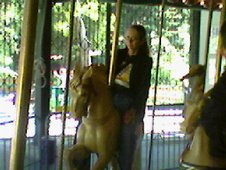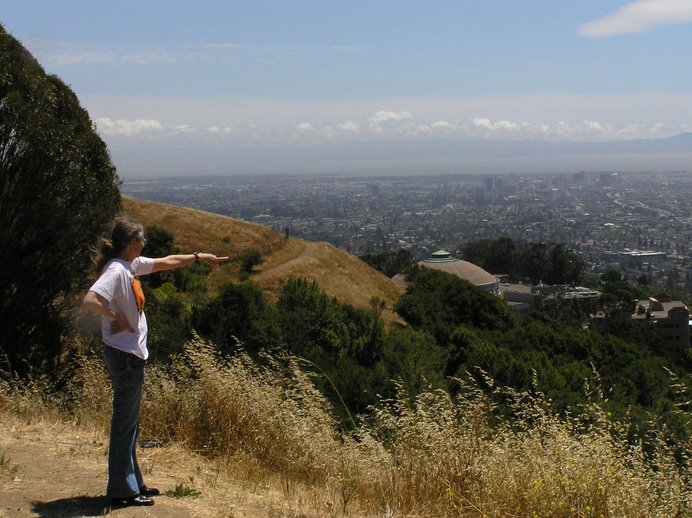The NYC 2007 Book Expo: I just met Walter Mosley!
I am currently wallowing around in a book-lover's dream! Imagine walking into the Jacob Javits Convenation Center and being confronted with the vision of approximately 5000 booths -- all filled with books! And they are actually giving away some of these books free. And they want to give them to ME! Pinch me, guys. I'm in Heaven.
First I went to Casemate's booth to pick up my copy of David Pratt's book, "Intifada: The Long Day of Rage". I had promised him that I would review it. Here's my instant review: "Buy it and read it." I met Pratt when I was in Baghdad in April. He was all duded out in his helmet and flack jacket. I was impressed. This is a journalist who goes out on the front lines and risks his life to bring us back the news. "Nothing is neutral in the Israeli-Palestinian conflict," wrote Pratt. "If there is one thing as a journalist I've learned during the almost 20 years of covering this story, it's the impossibility of ducking the political flack and sometimes downright vitriol that inevitably comes the way of anyone writing about this emotive issue." But Pratt really tries to get beyond the vitriol in this book -- and he succeeds.
Then I discovered the Book Expo press room. Free coffee, free blueberry muffins, free internet. I'm hooked up!
Then I wandered off to look for the ladies room and ran into Walter Mosley. Good grief! I've only been here two hours and all this has happened. And I've got two and a half whole days of Expo left to go! This place is Hog Heaven. I'm serious. It's better than Disneyland.
Then Mosley gave a talk. Here's what he said: "I published my first book when I was 38. I never wrote until I was 35." And on the way in, someone handed me a free copy of his latest book, "This Year You Will Write Your Novel." Oh boy.
"I would outline a book every once in a while," said Mosley, "when I have a deadline but usually I just write. The first draft of your book is unstructured. Then you go back and it gets structure -- if you're lucky. And if you read a book out loud into a tape recorder, it helps. It helps you find the music of the book -- which is part of the way that you...." I forgot what else he said because I got too fascinated by what he was saying next.
"When you tell a writer to write without restraint, you come to recognize those restraints and to go around them.... And you need to know that you need to sit down and write every day." And also do other stuff to get your book published and flogged. "But most people don't want to write a novel. They just want to be famous."
Mosley's book on writing a novel comes out of his vast experience. "But write a first draft. The first draft is difficult. Flannery O'Connor went over her work 178 times." You get that draft down and then go over it. "And you know that it's done when you can't improve it any more."
Regarding editing, "[Most editors] a lot of times are corporate.... The truth is that they don't want to read [your work]. They want to get in the way. 'You want to write about World War II? That's passe. That's over.'" Editors' jobs are to make your work better -- not to tell you what America wants. "The editor should be in your own head." You just freaking write your novel and then worry about editors later. "But there are a lot of good editors out there."
Why did Mosley change publishers between books? "They offered me twice the amount of money. But it wasn't just about the money. It showed that they had faith in me." He also wrote a novel, "Johnny Fry", that had graphic sex scenes. "People got snippy about that and said it was too pronographic. To me, when Hannibal Lector eats someone's brains with a spoon while he's still talking to the guy -- to me, that's pornographic! My book was more existential."
Then Mosley talked about his novel, "Fearless Jones". I'm reading "Fearless Jones" right now! I have a copy of it right here in my purse. I was reading it on my way here on the subway. "Detectives can be anything but one thing they never are is cowardly. Well, Paris Minton is aware of all this stuff" -- that as a detective he should be brave -- "but he is still afraid." So Mosley wrote the Fearless Jones books in order to explore that premise.
Regarding writing about the Watts riots in the 1960s, Mosley said, "History begins when there is nobody left alive to remember the event." So he wrote stories about World War II because those were the stories that he was told when he was a child. I know what he means. My father's stories about when he served in Occupied Japan are still very, very real to me.
"I wanted to write about the Watts riots but I couldn't talk about them until afterward because when you are actually in the riots, it's hard to talk about them so I wrote about a specific murder within the riots." His father wanted to riot so badly because he was angry too just like the rioters so instead he just went home and got drunk.
On screenwriting: "You know it's a good movie when you can turn the sound off and still understand what is going on. You have to keep the action moving -- it's like poetry, with seven or eight things going on."
On reading: "I don't read fast." Me neither! I always follow my finger when I read in order to try to speed things up but it's still hard-slogging.
On small presses: "You go into a [major publishing firm's office] with 20 white people there and they tell you, 'we're really trying to get your book out to the Black community,' so working with the Black press is more interesting. Plus the mainstream press is not really interested in the writers. They can still sell your books even when you are dead. Faulkner was good but who would publish him today? So the only way for 99% of writers to stay alive today is to go to an independent publisher."
The advantage of the corporate press is money. "But I have seven books with small presses because when you stop selling books, the corporate presses no longer remember you. And places like Wal-Mart just sell the same ten books." People in America make decisions based on the moment and the corporate presses cater to their whims, while the small presses are more committed to good literature and those are the ones that will keep you alive. "When you are owned by Alcoa or something, you are not committed to literature."
On self-publishing: "Sometimes it works really well." But you have to be a great promoter. "Terry McMillan sold books out of the trunk of her car."
On his next projects: He likes science-fiction. "I'm working on a book called 'Crosstown Bus to Oblivion' -- five stories where working-class Black men end up destroying the world. They don't want to but it just ends up that way." Then he read from his newly-published book, "Blonde Faith".
Wow! this was a great talk! This is a great convention! I'm in awe. Now I'm gonna go look around for a free lunch -- and will probably find that too. Like I said, this place is Heaven. If you live in the New York, do try to come on down. I'm not sure if the expo is open to the public or not but if it is, It's well worth the trip.
PS: The press room officer just informed me that you gotta be in the book industry to get in. Sorry about that. Write a best-seller and go next year?
skip to main |
skip to sidebar


Jane Stillwater is a freelance journalist, war correspondent, blogger, political Cassandra and author. Her latest motto is "Stop Wall Street, War Street, Big Pharma and Big Tech from destroying our world."

Blog Archive
-
▼
2007
(163)
-
▼
June
(20)
- There goes the neighborhood: Is the White House br...
- My latest housing co-op newsletter: The special "P...
- Location location location: Has Gitmo just bought ...
- Nuclear power: Will the last one to leave please t...
- Dishing the dirt at my housing co-op: The special ...
- Alien invasion: NAFTA, Bush, war & the great migra...
- The ultimate hostile take-over: America, a goose t...
- No title
- The American military: Are they Bush's flying mon...
- Rule of Law In Iraq: My address to the Berkeley-A...
- Sinking to their level: Bush's flea-bitten mafia i...
- Flowers in the Attic: GWB's blatant abuse of Ameri...
- Pirate Masters: "Mates, there's treasure to be had...
- My Savo Island housing co-op newsletter: The speci...
- Catching up on hot gossip: Friends & lunch & 1 bat...
- The National Security Presidential Directive: Now ...
- Day 3, 2007 Book Expo: Partying with librarians & ...
- Day 2 of the NYC Book Expo: Christopher Hitchens &...
- The NYC 2007 Book Expo: I just met Walter Mosley!I...
- My "Dear Jane" letter: There's not even ONE embed ...
-
▼
June
(20)
